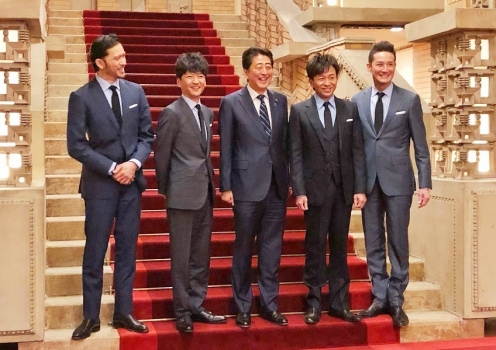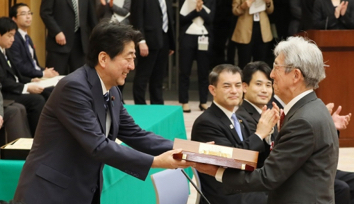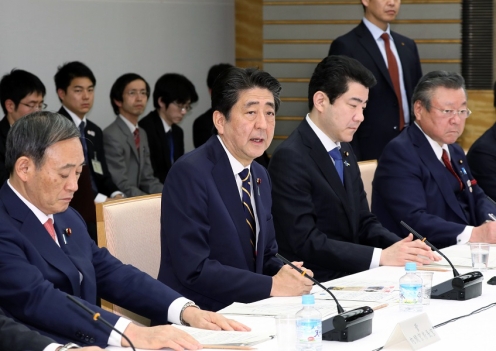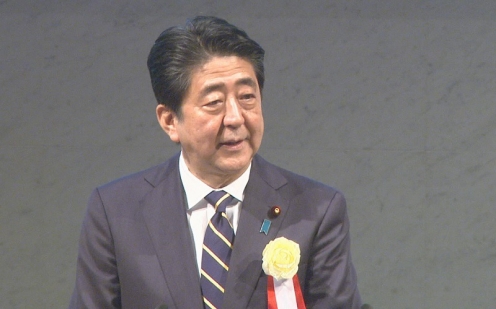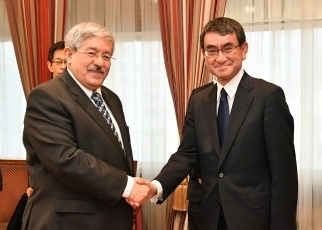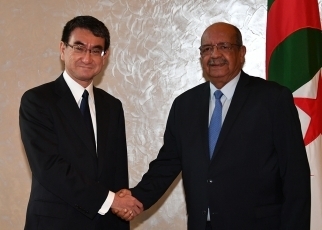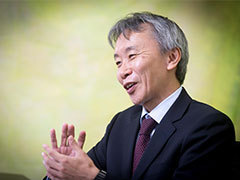New Year’s Reflection by Prime Minister Shinzo Abe
Cabinet Secretariat, Tuesday, January 1, 2019
[Provisional Translation]
Happy new year to everyone.
I hope that you all welcomed this final new year of the Heisei era in a pleasant and restful way.
Last year, major natural disasters occurred all around Japan, one after the other. The government will continue its concerted efforts to advance reconstruction so that all those affected can, at the earliest possible time, recover their day-to-day lives with peace of mind.
The Heisei era dawned alongside the bubble economy, and afterward the economy plunged into a long period of deflation. Facing two lost decades, the arrival of an “employment ice age,” unprecedented natural disasters, and the claim that a society with a decreasing population cannot grow, Japan came to be encircled by a wall named resignation.
We took on the challenge of that wall.
Six years later, the economy is growing and the employment rate for young people is at a level surpassing all previous records. This past spring, the rate of wage increases at small- and medium-sized enterprises hit its highest level in 20 years. And we attained a 19-year peak in agricultural income produced.
The passion of people deeply devoted to their hometowns has resulted in disaster-affected areas now vigorously achieving reconstruction. Thanks to the traditions and culture refined by the locals and their wholehearted hospitality, the number of tourists from overseas has risen above the wall of 10 million visitors per year and now exceeds 30 million annually.
As the warm winds of economic recovery began to reach every corner of the nation, local tax revenues climbed to their highest level in history.
This year, we will make full-out efforts to overcome Japan’s greatest challenge, the wall of a declining birthrate alongside an aging population. From this autumn, we will begin making early childhood education free. We will invest boldly in children, who will shoulder our future, and dramatically transform our social security system into one that is oriented to all generations, so that each generation, from children to the working generation to the elderly, can enjoy peace of mind.
A society in which all citizens are dynamically engaged will start at full scale. In it, all people -- women and men, young and old, and those with disabilities or intractable illnesses -- will be able demonstrate their abilities to the fullest.
Young people’s interests have changed significantly in recent years, and more and more young people find settling down in Japan’s local regions to be highly appealing. I want to take advantage of this opportunity and make the flow of people to local communities more substantial. We will push forward in revitalizing these regions in ways that are brimming with future potential.
This year we will also take on immense challenges on the diplomatic front. As we encounter major turning points such as the U.S.-North Korea summit meeting, Japan-Russia peace treaty negotiations, and the arrival of a new era in Japan-China relations, we will resolutely advance a total reassessment of Japan’s postwar diplomacy.
Japan holds the presidency of the G20, and we will welcome to Osaka President Donald Trump, President Vladimir Putin, President Xi Jinping, and other top leaders from around the world. This will truly be a year in which Japan shines on the world’s center stage.
We will meet with a major turning point in our history upon the succession to the Imperial Throne in May. As we head into the era that will follow Heisei, we will make this the first year of carving out Japan’s tomorrow. I am determined to stand at the fore as we do so.
Through a great amount of trust given to us by the Japanese people, we have advanced both domestic affairs and diplomacy, enabling us at long last to come this far. I am overcome by a sobering sense as we stand before the magnitude of the mission imparted upon us, namely, to take on our dwindling birthrate and aging society, regional vitalization, and the total reassessment of Japan’s postwar diplomacy.
Taking continuity as strength, and viewing our many efforts thus far and the trust from the public as tremendous sources of strength, I will commit myself entirely to tackling these challenges during the remainder of my time in office.
We will hand over to our children and our grandchildren a Japan full of hope that we are proud of. I pledge to devote myself in full to making this a reality.
In closing, I extend my most sincere wishes for 2019 to be a truly splendid year bringing joy and prosperity to one and all.
Shinzo Abe
Prime Minister of Japan
January 1, 2019
Meeting with Members of TOKIO
Cabinet Secretariat, Friday, December 28, 2018
On December 28, Prime Minister Shinzo Abe held a meeting with members of TOKIO at the Prime Minister's Official Residence.
Award Ceremony for the Japan Medical Research and Development Grand Prize
Cabinet Secretariat, Thursday, December 27, 2018
[Provisional translation]
On December 27, 2018, Prime Minister Shinzo Abe attended the second award ceremony for the Japan Medical Research and Development Grand Prize, held at the Prime Minister's Office.
The Prime Minister said in his address,
“To begin with, I congratulate all the winners of the awards under the prestigious Japan Medical Research and Development Grand Prize. I would like to offer my heartfelt congratulations.
Progress in life sciences has significantly extended people’s lifespans, to the point where it is said that we are now in a 100-year life society. Meanwhile, however, many diseases remain unconquered, and researchers around the world are competing fiercely to discover those cures.
Research has no borders. The world of research is highly competitive, and one must succeed on the global stage to join the ranks of the world’s leading researchers. At the same time, it is also a world with deep significance, in which even a single excellent result can make a universal contribution to humanity.
Dr. Ogawa and the other award-winners in attendance leapt into this truly fierce world of research with ambition, and have achieved great results while engaging in friendly rivalry with researchers around the globe. As Prime Minister, I express my sincere respect for your efforts.
This award was founded last year to recognize great contributions achieved in the field of research and development (R&D) and make them widely known among the public. Seeing such a wide range of award-winning achievements, from basic research to social implementation, I am once again reminded of Japan’s fundamental strength in R&D. The Government will continue to firmly support such creative and diverse research.
In closing, I would like to extend my best wishes for the continued success of all the award winners here today. Congratulations to all of you once again.”
Japan Exposition Comprehensive Promotion Council
Cabinet Secretariat, Wednesday, December 26, 2018
[Provisional Translation]
On December 26, 2018, Prime Minister Shinzo Abe held the first meeting of the Japan Exposition Comprehensive Promotion Council at the Prime Minister’s Office.
During the meeting, an exchange of views took place on the Japan Exposition.
Based on the exchange of views, the Prime Minister said,
“I would like to express my profound gratitude to everyone for attending this meeting of the Japan Exposition Comprehensive Promotion Council today during this busy time of the year.
We recently learned of the truly sudden passing of Mr. Masahiko Tsugawa, the greatest contributor to this vision to host a Japan Exposition. His passing came just as we were about to mark a series of major achievements, thanks to the tremendous contributions made by numerous people, beginning with the ‘Masterpieces of Japanese Buddhist Sculpture’ exhibition in Italy, followed by Japonisme 2018. Even now I cannot find words to describe my sadness.
As Mr. Tsugawa repeatedly expressed, his vision was to hold, as a culmination of those efforts, a Japan Exposition in 2020, when the Tokyo Olympic and Paralympic Games will be held and Japan will catch the world’s attention, so that people would visit Japan from around the world and experience the beauty of Japan in various regions for themselves. I myself would like to make the Japan Exposition a culmination of our efforts to introduce and further deepen understanding of the culture and beauty of Japan in all areas of the world.
Fortunately, many people have gone to see Japonisme 2018. Its large turnout has exceeded our expectations, and it is still being held with great success. As some of you also mentioned earlier, I would like to make this Japan Exposition a project of unmatched depth and scope, which attempts to systematically exhibit the beauty of Japan from the Jomon period* to the present, across a variety of sub-themes, under its overall theme of ‘Japanese people and nature.’
Today, we received valuable advice from you based on your respective knowledge and insight. Thank you very much. I would like to ask for your continued cooperation. In light of the direction we discussed today, I ask the relevant ministries to work together under the leadership of the Agency for Cultural Affairs to make all possible preparations for the Japan Exposition, with the cooperation of relevant companies and organizations.”
*The period of Japanese history dated between 14,000-300 BCE.
Meeting of Councillors of Keidanren (Japan Business Federation)
Cabinet Secretariat, Wednesday, December 26, 2018
[Provisional Translation]
On December 26, 2018, Prime Minister Shinzo Abe attended the seventh Meeting of Councillors of Keidanren (Japan Business Federation) held in Tokyo.
The Prime Minister said in his address,
“Today, I am attending this meeting together with three ministers, including Deputy Prime Minister Aso. I would like to express my sincere gratitude for inviting me. This is the first Meeting of Councillors under the new leadership of Chairman Nakanishi and Chairman Koga. In my case, this is the sixth consecutive year for me to attend this meeting. This is also a testament of the Abe Cabinet’s unwavering commitment to give the highest priority to the economy. I am not sure if that is the case. As it has been introduced just before, the Meeting of Councillors has been held on December 26, the inauguration day of the second Abe Cabinet, for the third year in a row; I have construed that that is why it is that way. I am sure it is completely by chance. Anyway, today marks exactly the sixth year of Abenomics.
It is said that this month might mark the 73rd consecutive month of Japan’s economic recovery and it would match the longest period of postwar economic recovery. The longest postwar economic recovery to date was from February 2002 during the Koizumi Cabinet, lasting through the first Abe Cabinet until February 2008 of the Fukuda Cabinet. Despite being the longest postwar economic recovery, it does not have a name like ‘Jimmu boom’ or ‘Iwato boom’ as in past economic recoveries. I think, most of us cannot even recollect that the economic recovery had lasted that long. In reality, nominal GDP grew by only 2.5% in six years. In addition, the business sentiment varied significantly by region. According to the region-based business sentiment of the Short-Term Economic Survey of Enterprises in Japan (Tankan) of the Bank of Japan (BoJ), it was only in Kanto and Tokai that we saw a positive business sentiment where more enterprises perceived that the economy was good than bad. This business sentiment was negative throughout the six years in Hokkaido and Shikoku. It was an economic recovery centered on the manufacturing industry, which is an export industry. While the prolonged deflation was left unresolved and employment and wages did not increase adequately, these warm winds of economy recovery did not reach the service industry and micro, small, and medium-sized enterprises all throughout Japan. This is the biggest regret from the economic policy of the first Abe Cabinet. In the last six years, however, nominal GDP has grown by 10.9%, more than four times compared to previously. The number of jobs has also risen by nearly four times, or over 3.7 million, on a quarterly basis. Above all, thanks to the efforts made by all of you, wages have increased to the highest level in this century for five consecutive years. We swiftly created a non-deflationary condition by releasing a set of three arrows, based on our reflection from the first Abe Cabinet, and launched a robust, virtuous economic cycle. Firmly supported by domestic demand, the ratio of active job openings to applicants has exceeded 1.0 for all 47 prefectures for the first time in history, and the winds of economic recovery now reach service industries and micro, small, and medium-sized enterprises in the regions. In fact, there are very little regional differences in the latest economic recovery. According to the region-based business sentiment of the BoJ’s Tankan, business sentiment consistently remained positive for five years in all nine regions of Japan, from Hokkaido down to Kyushu and Okinawa. Another large factor behind this was the expansion of ‘inbound consumption.’ The number of foreign tourists to Japan has set a new record and has surpassed 30 million this year. The overseas travel balance* has been in a deficit for more than 40 years on a monthly basis since the Osaka World Expo in 1970. While the balance was constantly in a deficit for 40 years, it has shifted to a surplus of 2 trillion yen last fiscal year. The Japanese economy in the Heisei period experienced the collapse of the bubble economy and the lost two decades, suffering from a deflation with no exit in sight. Even under such circumstances, we were able to structurally transform our economy from one that was solely dependent on the trade of goods, to one that also takes advantage of soft power, such as regional tourism resources and culinary culture, while ultimately stimulating domestic demand by creating a virtuous economic cycle. I believe we now have a ‘muscular’ economy that is more resilient to external shocks. While the Government does not comment on the level of stock prices, we can clearly state that the fundamentals of Japan’s economy are strong, amidst growing concerns over the outlook of the world economy. Furthermore, our task is clear. We must ‘train” our economy to make it an even more ‘muscular’ and thriving economy. That is the only way. We will make even greater efforts to implement the Growth Strategy, which aims for the realization of Society 5.0. We will pioneer the productivity revolution ahead of the world and transform this virtuous economy cycle into one that is even more robust.
Our lives have changed significantly over the 30 years of the Heisei period. In the first year of the Heisei period, ‘Pocket bell’ pagers were at the peak of their boom while mobile phones were ‘shoulder phones’ as large as a shoulder bag. They have been replaced with smartphones. We now live in an era in which a device comparable to a supercomputer of 30 years ago fits into our pockets. We were not able to even imagine the development of the Internet and social media 30 years ago. Today, YouTuber ranks among the top ten dream occupations of elementary school students. Individuals can send out messages to the world and be connected directly to the world. New possibilities are indeed emerging as we head towards Society 5.0. During the Heisei period, people’s work styles have significantly changed. As you likely recall, a top-selling product in the first year of the Heisei period was an energy drink that became famous for its TV commercial with the ‘Can you fight for 24 hours’ slogan. This room is probably full of people who were corporate fighters 30 years ago—maybe not corporate fighters but supervisors who rigorously commanded the corporate fighters. In the Heisei period, a five-day workweek was introduced; the monthly work hours decreased by 26 hours, which represents a 15% reduction. Meanwhile, per capita GDP increased by 25% or 850,000 yen in 30 years. This is the result of our efforts to steadily increase productivity. When Mr. Konosuke Matsushita (founder of Panasonic) introduced a five-day workweek practice, he reportedly said that one of the two remaining days of the week was for self-invigoration and the other day for self-cultivation. It is important to create time for refreshing one’s mind and for improving yourself. If life becomes more fulfilling, then productivity will no doubt increase. This year, the work style reform bills were enacted. They will correct the practice of working long hours and introduce equal pay for equal work. They constitute the first major reforms in 70 years. All people, including women and men, the elderly and the young, as well as people with disabilities and those suffering from intractable diseases, can work according to their lifestyles and find their work rewarding. As we enter the next period after Heisei, the Government will work together with everyone here to press forward with the work style reforms with a view to realizing a society in which all citizens are dynamically engaged.
Next year, we will see the historic succession to the Imperial throne. I am determined that we must make next year a year in which we pave the way to a new era for Japan. The Trans-Pacific Partnership (TPP) 11 (Comprehensive and Progressive Agreement for Trans-Pacific Partnership) will enter into force in four days. The Economic Partnership Agreement (EPA) between Japan and the European Union will also enter into force in February of next year. As a standard bearer for free trade, Japan will continue to advance a free, fair, and rules-based economic zone to the wider world. Amidst the rapidly declining birthrate and aging population, we need to urgently reform the employment system, setting our sights on a 100-year life society. Japan’s social security system must be reformed to a system that can bring peace of mind to all generations. With the cooperation of the business community, tuition-free early childhood education is set to be introduced in October. From April of next year, we will also make tuition fees free for higher education for those children who are truly in need. They constitute the first major reforms since tuition-free basic education was introduced after the end of World War II. The Abe Cabinet will boldly invest in the future of our children.
The source of funding for these initiatives, the consumption tax, will be increased to 10% in October of next year. The previous increase to 8% had significant impacts on the economy. Learning greatly from this experience, this time we have included temporary special measures and bold tax reduction measures in next year’s budget, in addition to the second supplementary budget. The Government has prepared a more than full set of countermeasures in response to the consumption tax increase, of a level that returns all of the incremental revenue from the consumption tax increase to the people. I would like to ask for the cooperation of the business community in this endeavor. And now onto what you may have been expecting—Chairman Nakanishi and everyone in attendance, I would like to ask that wages be increased to make the economic recovery trend even more certain. Continuing in the vein of my earlier remarks, I am only mentioning this for your reference; the rate of wage increase in the first year of the Heisei period was apparently about twice as high as this year’s level. I can see the reaction gradually becoming mixed and perhaps I should refrain from saying the exact percentage. For your reference, it was 5%. It was just for your reference.
This year, Japan won its bid to host the World Expo 2025. I express my gratitude to all of you for your cooperation.. We now have a major target for the future, following the 2020 Tokyo Olympic and Paralympic Games. When I was a child, I saw the 1964 Tokyo Olympics and the 1970 Osaka World Expo firsthand. I remember thinking Japan was now part of the global community. As we are at another turning point in our history, I would like to create with all of you a dynamic era in which our children, our next generation, will feel strong power in their bodies in their journey to the future, using 2020 and 2025 as momentum. I am looking forward to working together with you next year as well. I would like to close my remarks by wishing everyone a wonderful new year. Thank you very much.”
*The balance of spending by foreign tourists in Japan and spending by Japanese nationals overseas
Foreign Minister Kono Pays a Courtesy Call on Prime Minister of the People’s Republic of Algeria Ouyahia
Foreign Affairs, Thursday, December 27, 2018
On December 27, commencing at 11:10 AM (local time, 07:10 PM Japan time) for approximately 45 minutes, Mr. Taro Kono, Minister for Foreign Affairs, paid a courtesy call on H.E. Mr. Ahmed OUYAHIA, Prime Minister of the People's Republic of Algeria, during his visit to Algeria. The overview of the meeting is as follows.
In the beginning, H.E. Mr. Ouyahia welcomed Minister Kono's visit. Minister Kono stated that the relationship between Japan and Algeria has been on very good terms for a long time, ever since the Far East office of the Front de Lib?ration Nationale (FLN) was opend in Tokyo in 1958, that he wished to elevate the relationship to an even higher level, taking the opportunity of his visit, and that he looked forward to the visit to Japan by Foreign Minister Messahel next year. In response, H.E. Mr. Ouyahia said that Japan is an important partner for Algeria, and welcomed Minister Kono's intension to elevarte bilateral relatons to a higher level.
Afterwards, H.E. Mr. Ouyahia explained the history and current state of Algeria's economy. The two confirmed that both governments will set up legal frameworks such as an investment agreement and a taxation agreement, and also confirmed that they looked forward to the promotion of exchanges at the level of both countries' general public, which would contribute to the diversification of Algeria's industry.
The two also shared the view that both countires will proceed with cooperation on partnerships in the security and anti-terrorism field, as well as in the international arena including TICAD 7.
Japan-Algeria Foreign Ministers' Meeting
Foreign Affairs, Thursday, December 27, 2018
On December 27, commencing at 8:35 AM (local time, 04:35 PM Japan time) for appriximately 90 minutes, Mr. Taro Kono, Minister for Foreign Affairs, held a meeting with H.E. Mr. Abdelkader MESSAHEL, Minister of Foreign Affairs of the People's Republic of Algeria, during his visit to Algeria. The overview of the meeting is as follows. A luncheon hosted by H.E. Mr. Messahael was held later the same day.
In the beginning, Minister Kono welcomed their reunion since they met at the Japan-Arab Political Dialogue held in September 2017, and stated that his visit is the first time as a Foreign Minister of Japan in 8 years. Minister Kono also stated that, the two countries have traditionally enjoyed good relations, and since Japan values Algeria as a contributor to stability in the Middle East and North Aftican region, he wished to further strengthen bilateral relations through this visit, such as strengthening political dialogues. In response, H.E. Mr. Messahel said that Japan and Algeria had historically enjoyed good relations since Algeria's war of independence, and wished to strengthen the good partnership including political dialogues.
Minister Kono said he was paying attention to Algeria's economoic potentials, and requested Algeria's cooperation in setting up legal frameworks for Japanese companies' entry to Algeria, such as an investment agreement and a taxation agreement. In response, H.E. Mr. Messahel stated that he completely shared with Minister Kono the direction of bilateral relations including the economic relationship, and that Algeria has high economic potential as an African nation facing the Mediterranean Sea, and looked forward to the expansion of bilateral economic relations.
The two also exchanged views on the security situation and anti-terrorism measures in Algeria. Minister Kono noted that Japan has a high interest in the security situation and anti-terrorism measures in Algeria, from the viewpoint of enabling Japanese companies to enter Algeria. They shared the view that two countries will proceed with cooperation in the security and anti-terrorism, including dialogues by experts in the field.
Afterwards, the two confirmed their cooperation in the international arena including TICAD, and exchanged views on the situation in the Middle East, among other things.
TOWARD TICAD 7: 'Africa and Me' Part 1 - JICA Africa Department Head Kato: Africa and Japan are special partners with a trust-based relationship
JICA, Friday, January 4, 2019
In August, the 7th Tokyo International Conference on African Development (TICAD 7) will be held in Yokohama. Participants, including leaders from various African countries, private companies, researchers and many citizens' groups, will discuss development initiatives for Africa from multiple angles.
In this series, as we approach TICAD 7, JICA staff members, experts and stakeholders involved in Africa talk about how JICA has addressed Africa in the past and how it will in the future, based on their own experiences, referring to the key phrases "partnership," "innovation," "Japan's strengths" and "years-long initiatives."
Part 1 introduces Ryuichi Kato, director general of the Africa Department of JICA, who has been involved in cooporation with Africa for many years, including assignments to Côte d'Ivoire and Senegal. Mr. Kato says, "Africa and Japan are special partners that built up a relationship based on trust."
TICAD tells the tale of trends in African development
"Africa is rich in diversity and has many aspects to consider. The period since 2000, which was a turning point, has brought great changes, and Africa, which has been called 'the continent that doesn't experience economic growth' has begun growing against a backdrop of steep rises in natural resource prices. Given that situation, opportunities are increasing for Japan to make Africa a growth partner, including at TICAD. Even so, based on the fact that the situation in each country varies greatly regarding such factors as the natural environment, ethnic groups, the presence or absence of natural resources and the quality of economic growth, we must approach countries carefully," Mr. Kato said.
"Japan first held TICAD in 1993. The international community's interest in Africa, which was an object of competition between East and West after the end of the Cold War, was fading. Japan proposed to Africa working together as equal partners on such problems as poverty reduction and economic development, and this had a big impact on the international community."
Innovation is the key to the new policy on contributing to Africa
At TICAD V, which was held in Yokohama in 2013, the role of private investment was emphasized. And at TICAD VI, which was held in Kenya three years ago, the importance of public-private partnerships was endorsed. Based on these developments, "One theme at TICAD 7 will probably be the creation of innovative approaches that bring about new social impacts in response to issues facing Africa and public-private partnerships to realize them," Mr. Kato said.
"Innovations applied first in Africa will be used in Japan, and both Africa and Japan will be enriched by them," Mr. Kato said, citing such ingenuity as remote medical examinations using ICT and the use of drones to transport blood to depopulated areas.
JICA, which has bases in 33 countries in Africa, plays a vital role as a catalyst that understands local needs and issues and connects various partners including Japanese companies to the field, along with its experts who work in various specialties and Japan Overseas Cooperation Volunteers who work in remote areas.
And for TICAD, which will be held in Japan for the first time in six years, Mr. Kato is emphasizing initiatives to connect various Japanese localities with Africa. "Matching with local SMEs that have the technology to solve Africa's problems is essential to Africa's growth. Also, students from Africa who study at universities in various places in Japan through the ABE Initiative and other JICA support programs are expected to tell people in those communities about Africa."
JICA's distinctive practice of frequent dialogue remains fundamental
Though the forms of cooporation change with the times, such as when new technologies are adopted, at the foundation is the distinctively JICA stance of "providing cooporation while maintaining frequent dialogue to grasp partners' needs," which JICA has maintained since Japan held the first TICAD.
"In the fields of human resource development and infrastructure investment, JICA has been continuing initiatives in Africa that leverage Japanese strengths for many years," Mr. Kato said. "Rather than forcing your logic on a country, it's important to understand that country's culture, society and economy while building a relationship of trust."
Mr. Kato happened to be present at the site where civil war broke out in Côte d'Ivoire when he was assigned to the country. "I saw before my very eyes the reality of Africa that under a clear, quiet sky, the tranquility of yesterday can crumble in a moment. It was that moment I made up my mind that we would engage with Africa precisely because it faces such a grave situation." Holding that idea close, Mr. Kato focuses on the future of Africa.
Ryuichi Kato
Director general of the Africa Department, JICA
In 1987 Mr. Kato joined the Japan International Cooperation Agency. After working in Côte d'Ivoire and Senegal, he served his second appointment in Senegal from 2012 to 2016 as the chief representative of the JICA Senegal Office. He was born in Yamagata Prefecture.




























